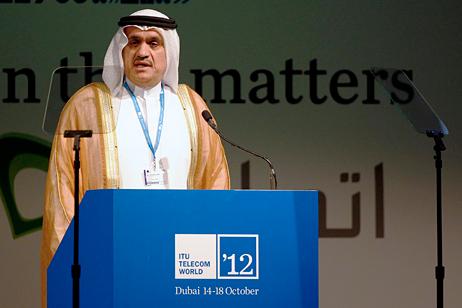Etisalat has pumped Dh15 billion (US$4.08bn) into making the UAE one of the most wired nations on Earth, the company said on the first day of the Gitex Technology Week in Dubai.
About 3 million kilometres of fibre-optic cabling have been installed across the country, carrying high-speed broadband, television broadcasts and voice calls.
Despite the heavy outlay the company was yet to make a significant return on its investment, said Saleh Al Abdouli, the chief executive for Etisalat in the UAE.
"No returns have been made yet from the fibre-optic network by Etisalat," Mr Al Abdouli told the Wam news agency. "But with this achievement, we contributed to the process of sustainable development in the UAE and achieved network readiness." The Dh15bn outlay is significantly higher than Etisalat's previously reported investment on its infrastructure.
Last year, the company said it had invested Dh6bn in both its high-speed 4G mobile data network and its fibre-optic connections.
But the higher figure also includes the cost of connecting the main fibre-optic cables to individual homes, Etisalat told The National.
The UAE's largest telecoms operator has operations in 15 countries across the Middle East, Africa and Asia. Yet Etisalat's international ambitions have suffered several setbacks over the past 18 months.
The company this year withdrew from India after losing its licence to operate there, and in September said it had reduced its stake in its Indonesian operation. Etisalat's negotiations to acquire rival player Zain Group collapsed last year.
Ahmad Abdulkarim Julfar, the group chief executive of Etisalat, said the group was not looking to exit any other markets.
"We are very happy with our international operations, even Africa," said Mr Julfar. "So we are not going to exit any markets."
Etisalat said in September it had raised Dh1.87bn by selling shares in the Indonesian mobile operator XL Axiata. It retains a 4.2 per cent stake in the company, which Mr Julfar said the company plans to retain "for the time being".
Etisalat is not currently looking to enter any additional foreign markets, and doing so in the future would "depend on market conditions," Mr Julfar said.
Mr Julfar was speaking on the sidelines of the Gitex Technology Week in Dubai, which started on Sunday.
Representatives of other regional telecoms companies were in attendance at the event, which is running concurrently with the ITU Telecom World 2012 conference.
Sheikh Abdullah bin Mohammed bin Saud Al Thani, the chairman of Qtel Group, used the event to raised the issue of high roaming charges for mobile phone subscribers.
"As operators, we must fix the problem of international roaming charges," he said.

